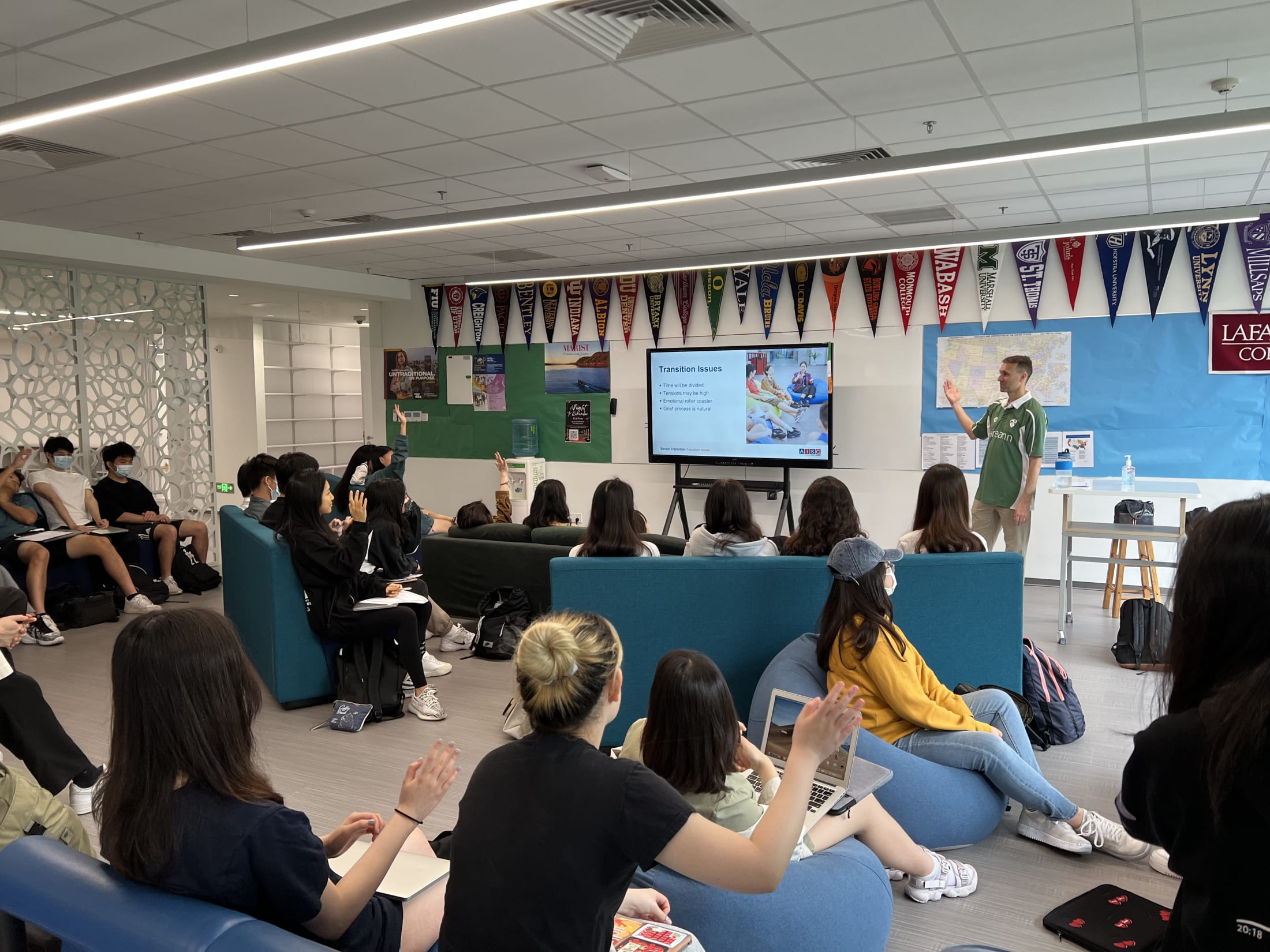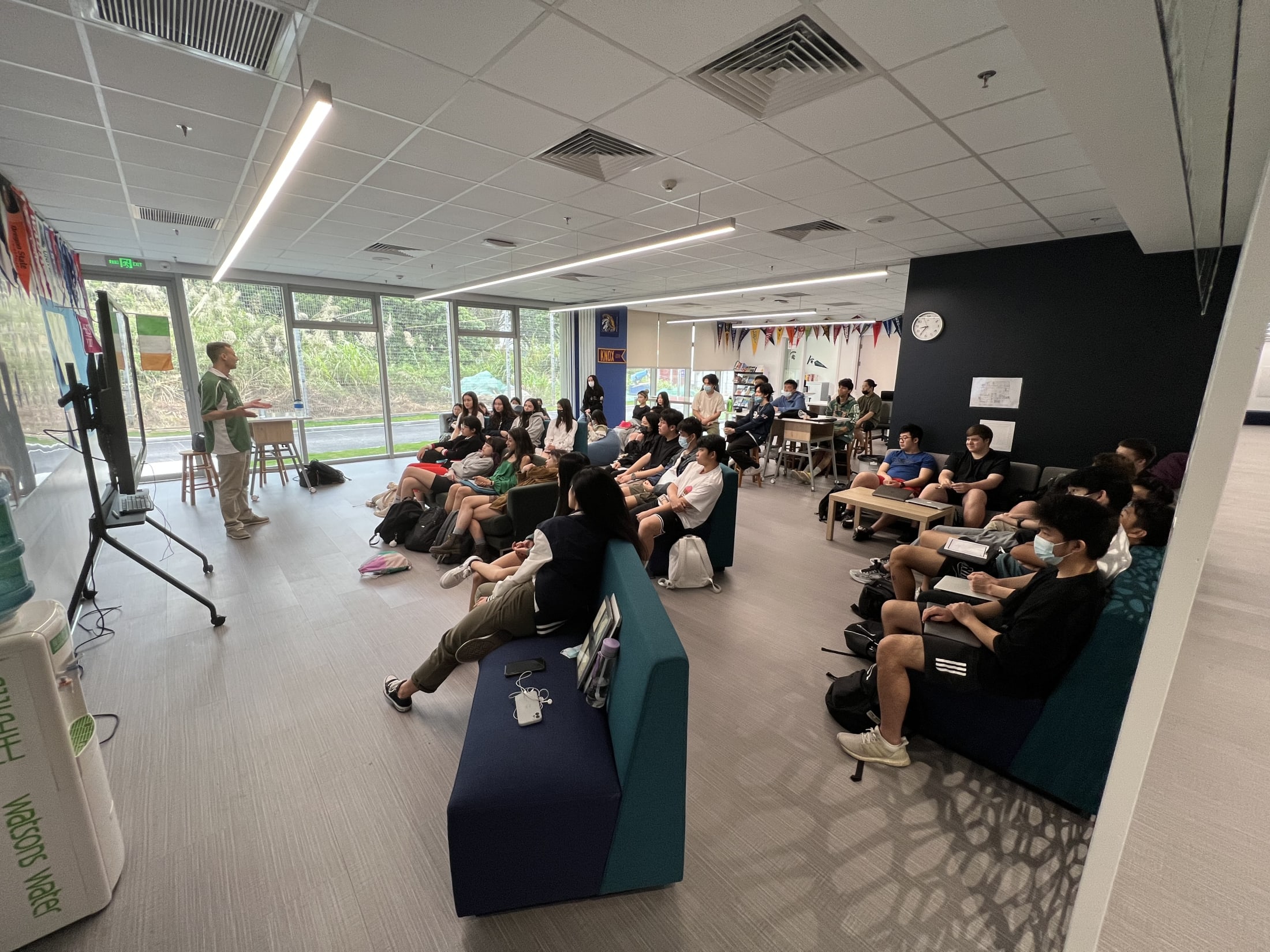AISG College Counseling
AISG employs a full-time college counselor to facilitate the application process. The college counselor is there not only for the students, but also for the parents, offering a tailor-made, individualized college plan aimed at connecting students to pathways and college programs they are passionate about pursuing.
 |
Our College Counselor AISG's current college counselor is Dr. Justin Walker, whose high-level profile and extensive expertise ensure AISG's outreach and reputation in the college circuit. |
Public Displays of Admission
As a college counselor, my job is centered around the idea of a student gaining admission to college. You would think I would be the loudest advocate that we all shout from the rooftops every time that admissions letter comes in, but you would be wrong.
Throughout the year I am eagerly awaiting news and ask all my students to let me know, one way or the other, when decisions are rendered. Each one of my students receives from me a congratulatory sentence (in person or email, depending on how they notify me) and I have doled out hand-written notes, fist bumps, high fives, handshakes and hugs on many occasions. And all too often, there have been tears, solemn condolences, and meetings to reconcile the disappointments that are inevitable during this time. As a counselor, I care very much about my students’ reactions during this time. But what concerns me most is what we – schools, parents, media, society – do to take what is already the most emotional and stressful time in a young person’s academic life (up to that point) and make it worse.
One practice schools have employed is to promote university acceptances as a part of the end-of-year culmination activities. Students will tape names and logos to their mortarboards of their college of attendance or schools may call the student’s name at graduation and follow with the statement, “....will be attending so-and-so university this fall.” Names and placements show up on scrolling marquees and televisions in school lobbies, in senior announcements, and in yearbooks. What happens? In addition to the promotion of name-branding, which I discuss later, there is the assumption that those not listed (or left with that menacing blank spot below their picture) have done something wrong or weren’t good enough to get in. This is almost never the case.
The typical counterargument (often from parents, interestingly) is that we should celebrate these accomplishments, and I wholeheartedly agree. But I am taking this opportunity to ask you to think about how you celebrate. Graduation is a celebration of the journey and accomplishment of one’s formative years. It is already a special event and does not need additional fodder to be special. Many graduation messages like to focus on the next step, the future, and that is all well and good, but it is also a great opportunity to sit back and enjoy that moment, for it will never happen again, like this. Many students will not yet know where they are going to school at this time. Students applying to Australia, New Zealand, Korea, parts of Europe, South America, and Africa my not even have applied yet, let alone been rendered a decision. Other students are awaiting IB results in July to secure their conditional offers or are on a waitlist and eagerly awaiting news that they have come off it.
This is a stressful time for many students and families, and the repeated public messaging of getting in only further exacerbates the dissonance between those who are in and those who are not yet.

Social media is a common platform for shouting the latest acceptance. Parents take to WeChat and What’sApp groups trumpeting their child’s successes. There are a couple of problems with this. First off, most people do not really care. Sure, there are all these shared messages among students, their friends, and the parent groups early in the year about how “we are all in this together” but come acceptance time, people only want to get theirs.
Bitterness can accompany very mixed feelings when others receive news and you haven’t, or someone is in and you are not. Many students apply to the same schools and people start feeling angry if another gets in (particularly if you do not). Secondly, the role social media has taken on in recent years (or maybe always – that is a discussion for another time) is that posting this information on these platforms is really less about sharing the news and more about seeking recognition and affirmation. There are many tools and methods to communicate to our closer friends and family, our target audiences, without having to include the rest of the world.
Consider the timing of release of these admission decisions. The early round in the US comes out in late December. Students may be taking finals. Others may be finally relaxing after an insane first semester of their final year where college applications, IB predicted grades, and school life has taken up far too much time. The holiday season is for family time, travel, celebration and thanks, not anxiety over being denied or deferred. Then comes the regular round in spring. After months of waiting, we even have a specific day where schools dump bad news on students (the 8 Ivy League schools alone account for approximately 300,000 denials per year). Spring break, class trips, and mock exams are known to fall around the same time. (And now that I think about it, between early and regular decision, IB and AP results, all major scores come out when we, counselors, are not as available to students. I sense a conspiracy.) Stress is at an all-time high for students.

I literally turned down a job once because as I researched a school, I landed on their College Counselor page and it was a picture of students at graduation from behind and on their caps were names of schools. What did I see? Stanford, UCLA, MIT. Don’t get me wrong; these are all fine institutions. But I saw many caps without a name. Now, is it because students haven't found their place or even applied, or is it because people don’t feel valued? If you put SUNY on your cap and to your left and right are Brown and Yale, how do people see you (or how do you think people see you)? Maybe SUNY is closest to your family, or you want to save money and go to a top-notch grad school.
Public promotion of schools does nothing to recognize fit and everything to promote a culture where a relatively small group of schools is all people care about. Consider the girl from Norway who will attend university in Oslo. It is a leading school in Europe, her family all went there, and she applied nowhere else. It is not in her nature or culture to put this name on her hat or post it on Facebook. She doesn’t care about the Ivy League, even if you think she should. But should she feel obligated to self-promote? Should we make assumptions about her due to her lack of public promotion?
So how should people recognize university acceptance, as it is a great accomplishment?
❖ Share it humbly with your counselor, family, and perhaps a close friend that knows how you feel about the schools, but wait with the public announcements until you have made a final decision (or even then, keep this info to your inner circle and off social media).
❖ Find a way to celebrate that is meaningful to you – go out to dinner, take a trip.
❖ Schools should avoid any public displays that give the impression that the timing of acceptance and the location of attendance carry some sort of prestige of their own. Always schools should promote best fit for students and applaud them in achieving that.
In summary, public displays of admission do more harm than good. They reinforce hype around certain schools the media wants us to care about. They often create more stress and angst over feelings of self-worth for many students. But what they really do is diminish the value of university. You see, getting into Harvard means nothing in the end. All that matters is what we do with a university education, and that can happen anywhere. The admission letter is not the golden ticket. It is simply the introduction to the next phase in life, full of new challenges and opportunities.
University is a match to be made, not a trophy to be won.
At AISG, this valuable counseling insight is one of the many reasons why AISG is The Premier International School in Guangzhou. To learn more about AISG College Counseling, click here.
Our Next Article About College Counseling
Stay tuned for next month’s article about common mistakes in the application process.